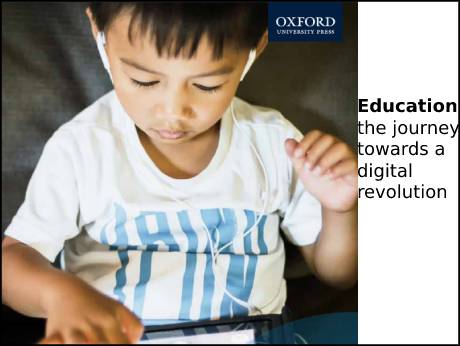
April 12 2021: In India, the transition to online learning was done rather well, However, a major issue identified by respondents was unequal access to digital learning devices, as well as a lack of internet connectivity and little familiarity around the tools required to facilitate online learning," finds a new report from Oxford University Press (OUP)
OUP studied seven countries—the UK, India, Brazil, Pakistan, Spain, Turkey, and South Africa, to reflect on the shift in learning ecosystem and what the “future could hold for education."
______________________________________________________
See our Image of the Day for graphical highlights from the report
------------------------------------------------------------------------------------------
The pandemic has paved the way for a hybrid model in education, combining digital and traditional methods of teaching and learning. The report, ‘Education: The journey towards a digital revolution’, explores both the short and long-term impact of shifting to digital learning, while reflecting on what we have learned and what the future could hold for education.
With the pandemic affecting more than 1.7bn students worldwide over the past 12 months, the report analyses how teachers, students, and parents adapted to new ways of delivering education, and will continue to utilize digital learning tools and resources to shape educational practice in the future.
While there were clear trends across all regions surveyed, there were also similarities across all markets:
The report urges governments and educators globally to address the challenges brought about by a year of educational disruption and ensure that positive developments from the past year are not lost. Using the findings of our research, we make key recommendations, including:
Daisy Christodoulou, OUP author of 'Teachers vs Tech? The case for an Ed tech Revolution', said of the research: ‘COVID-19 has dramatically changed the way we teach and learn. How many of these changes will persist, and how many will be abandoned? This report draws on evidence from schools and universities around the world to find out the digital strategies that have worked well, and the work that still needs to be done.’
Nigel Portwood, CEO of Oxford University Press, spoke about the research: ‘The coronavirus pandemic has, unsurprisingly, prompted a rapid increase in the adoption of digital learning. As we start to reimagine what education may look like in the future, it is imperative that the government—and indeed, governments all over the world—learn from those who have been on the frontline, delivering and receiving learning. We have a huge opportunity to learn from all our experience to develop education systems that will work for both local and global society.’